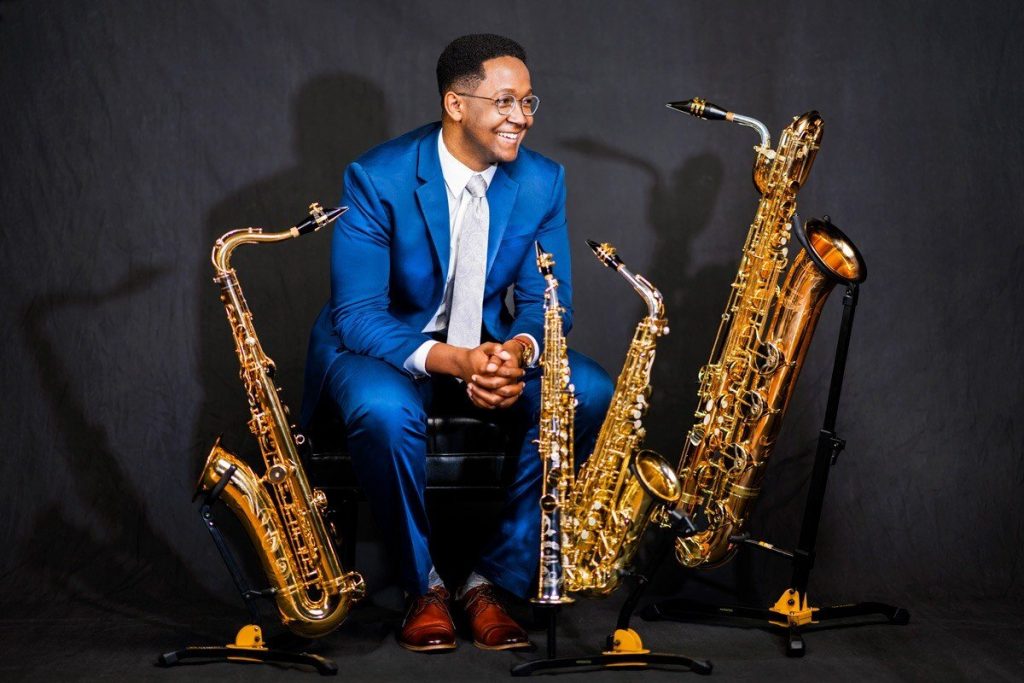by Jarrett Hoffman

In another way, the piece — which will conclude his free program with pianist Xak Bjerken on October 5 at 7:30 pm in Mixon Hall at CIM, where Banks is a visiting faculty member — is about something more abstract: a merging of different parts of his identity that previously didn’t feel as if they could coexist.
“As a classical musician, the vast majority of my colleagues have little knowledge or understanding of Black culture or how it influences my music-making,” Banks writes in his program note from 2021, when he performed the piece as part of his Young Concert Artists debut recital. “As a Black man from North Carolina, many of my family and friends don’t have a true sense of what I do and love as a classical performer and composer. I have also spent an incredible amount of time and energy on keeping these worlds separate and trying to show up in each as if the other didn’t exist.”
Come As You Are — the title is about not only embracing personal truths, but also reaching out to different groups of people. “Every time I play it, depending on where I am, people come up to me and talk about different aspects of it,” Banks said during a recent interview.
Audience members might mention how they recognized all the spirituals and sacred music: I Still Have Joy, His Eye is On the Sparrow, Wade in the Water, and My Lord, What a Morning. Or, as was the case after his performance of the piece this past summer at the Spoleto Festival, they might remark on “those Rachmaninoff quotes in there,” Banks said. “I like the fact that everyone gets something different out of it.”
What Banks gets out of it as a performer is a sense of expressive freedom. He recounted being told in music school that he was often doing “too much” in his playing. “And I get that — I understand it can be too much for Brahms. But I wanted to have music where it is the right thing, because growing up with gospel music and church music, the idea of raw communication and not always being tempered was really important.”
When you’re the composer, one thing you don’t have to worry about is the composer’s intention. “So I change stuff — sometimes I add little things here and there just because it feels right. And I love that feeling.”
If Come As You Are is partly a portrayal of Banks’ merging identities, how did those identities begin to merge in the first place?
“It’s a lot of things,” he said after a pause. “During my graduate degree, I started becoming increasingly aware of my differences, you know, as a Black student in conservatory environments. I started realizing, ‘Oh, everyone doesn’t feel these same things.’”
He began to ask questions like, “How can we learn more about Black composers?” and “How can we have a more diverse curriculum in general, in small ways and big ways?”
There was some support.
There was lots of resistance.
“That was very disappointing for me as a student,” Banks said. “After I became a teacher, I started to understand where they were coming from a little bit. You’ve been teaching that class for 25 years, you have a family, and you have your whole life going on, and all of a sudden, someone’s coming in and asking you to change big parts of what you do. And you don’t really have any incentive to change it. Your job is not on the line, and you’re not going to get paid more, or less. So getting some tastes of real adult life made me sort of understand why it was hard — obviously not agree with it, but understand a little bit better.”
That resistance Banks faced gave him a new mission. “It was like, I can’t rely on anyone else to change anything, so I’d better get pretty good so I can just do it myself. And that’s a hundred percent the fuel for my entire career. I’ve wanted to make these changes, and in order to get to the people that can make them, you have to be in certain places.”
Banks said he started to realize that in order to make change, he would also have to come to terms with himself in several ways. “Like, this is who I am. I’m not apologizing for it. I’m going to use these aspects of who I am to help push the classical music world forward, and push the saxophone forward in the classical music world.
“Basically it required self-reflection to be able to continue forward at all.”
The concert is free, but seating passes are required. It will also be livestreamed. Click here for more information.
Published on ClevelandClassical.com September 28, 2023.
Click here for a printable copy of this article



